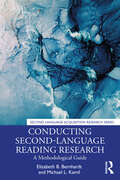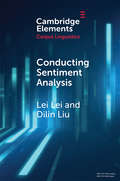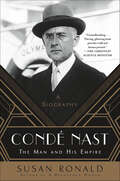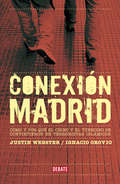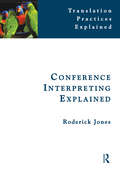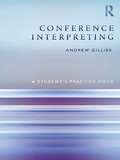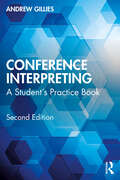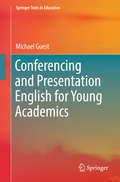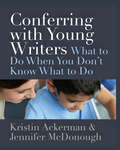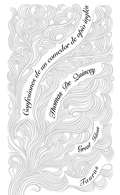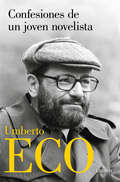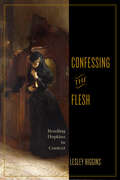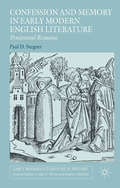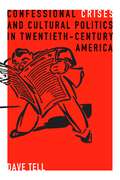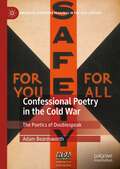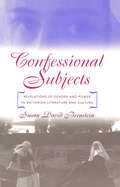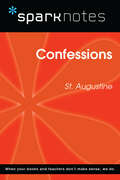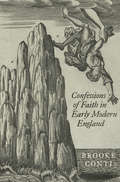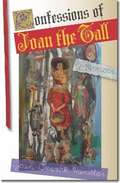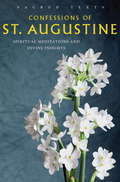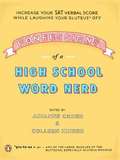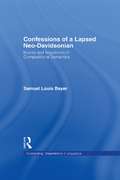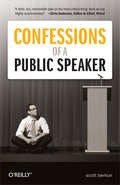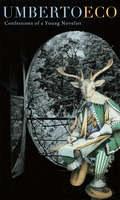- Table View
- List View
Conducting Second-Language Reading Research: A Methodological Guide (Second Language Acquisition Research Series)
by Elizabeth B. Bernhardt Michael L. KamilThis is the first hands-on methods guide for second-language (L2) reading research. The authors expertly and critically situate L2 reading and literacy as a multivariate, interactive process and define terms, concepts, and research tools in connection with theory and a rich body of past empirical work, with lessons to learn and pitfalls to avoid. They concretely detail how to design empirical studies, collect data, and analyze findings in this important area. Authored by world experts on first-language (L1) and L2 reading, this book provides a comprehensive, critical, theory-driven review of methods in L2 reading research, offering a step-by-step guide from research design to study execution and data analysis. With useful pedagogical features and a unique database of L2 reading studies from around the world over three decades, this will be an invaluable resource to students and researchers of second-language acquisition, applied linguistics, education, and related areas.
Conducting Sentiment Analysis (Elements in Corpus Linguistics)
by Lei Lei Dilin LiuThis Element provides a basic introduction to sentiment analysis, aimed at helping students and professionals in corpus linguistics to understand what sentiment analysis is, how it is conducted, and where it can be applied. It begins with a definition of sentiment analysis and a discussion of the domains where sentiment analysis is conducted and used the most. Then, it introduces two main methods that are commonly used in sentiment analysis known as “supervised machine-learning” and “unsupervised learning (or lexicon-based)” methods, followed by a step-by-step explanation about how to perform sentiment analysis with R. The Element then provides two detailed examples or cases of sentiment and emotion analysis, with one using an unsupervised method and the other using a supervised learning method.
Condé Nast: The Man and His Empire: A Biography
by Susan RonaldThe first biography in over thirty years of Condé Nast, the pioneering publisher of Vogue and Vanity Fair and main rival to media magnate William Randolph Hearst.Condé Nast’s life and career was as high profile and glamorous as his magazines. Moving to New York in the early twentieth century with just the shirt on his back, he soon became the highest paid executive in the United States, acquiring Vogue in 1909 and Vanity Fair in 1913. Alongside his editors, Edna Woolman Chase at Vogue and Frank Crowninshield at Vanity Fair, he built the first-ever international magazine empire, introducing European modern art, style, and fashions to an American audience. Credited with creating the “café society,” Nast became a permanent fixture on the international fashion scene and a major figure in New York society. His superbly appointed apartment at 1040 Park Avenue, decorated by the legendary Elsie de Wolfe, became a gathering place for the major artistic figures of the time. Nast launched the careers of icons like Cecil Beaton, Clare Boothe Luce, Lee Miller, Dorothy Parker and Noel Coward. He left behind a legacy that endures today in media powerhouses such as Anna Wintour, Tina Brown, and Graydon Carter.Written with the cooperation of his family on both sides of the Atlantic and a dedicated team at Condé Nast Publications, critically acclaimed biographer Susan Ronald reveals the life of an extraordinary American success story.
Conexión Madrid: Cómo y por qué el chino y el tunecino se convirtieron en terroristas islámicos
by Justin Webster Ignacio OrovioLa más profunda investigación sobre los orígenes del 11-M, el atentado que conmovió los cimientos de la sociedad española y el más sangriento, realizado por el fundamentalismo islámico en suelo europeo. Cuando se cumplen cinco años de los brutales atentados del 11-M, este libro reconstruye las vidas paralelas de los dos hombres fundamentales para su organización: Jamal Ahmidan y Sarhane ben Abdelmajid Fakhet. Dos jóvenes inmigrantes musulmanes, asentados en España desde los noventa, y cuyo encuentro, apenas seis meses antes, resultó decisivo para la preparación y ejecución del mayor atentado de la historia de Europa. Durante dos años y medio, Justin Webster e Ignacio Orovio reconstruyeron al detalle las trayectorias del Chino y el Tunecino. Sólo la confluencia de esas dos personalidades tan dispares, un delincuente y un fundamentalista religioso, explica una acción de esas características; ninguno de los dos por separado hubiera sido capaz de organizarla. El minucioso análisis de más de 100.000 páginas de documentos jurídicos, el contacto con fuentes directas que en muchos casos hablaban por primera vez, y visitas a Marruecos, Túnez, Turquía, Holanda e Inglaterra, buscando una historia que se remontaba a principios de los años noventa, consiguen delinear la ruta psicológica de los líderes de la célula.
Conference Interpreting Explained (Translation Practices Explained #Vol. 6)
by Roderick JonesRoderick Jones adopts a very practical approach to both consecutive and simultaneous interpreting, providing detailed illustrations of note-taking, reformulation, the 'salami' technique, simplification, generalization, anticipation, and so on, including numerous tricks-of-the-trade such as how to handle difficult speakers and how to interpret untranslatable jokes. Numerous examples are offered at every stage, all in English or 'foreignized' English. Although primarily written as a practitioner's explanation rather than a theorist's speculation, the book includes notes on concepts such as units of meaning, translation units and discourse structure, as well as stances on more polemical issues such as the use of omission and the ethics of interpreting mistakes. The book concludes with a comment on the pleasure of conference interpreting, as well as a glossary and suggested further readings. In all, it fills a major gap in English-language publications on interpreting, providing an introduction for beginners, a down-to-earth guide for students, and a handy compendium for teachers. The first edition of this book was published in the series Translation Theories explained, at a time when St. Jerome had no separate series for books on practice as such. Happily, it has now found its rightful place in the Practices series. Modifications with respect to the first edition include an updated reading list, an index, and guideline tasks for training sessions. The popularity of the book since its first appearance in 1998 suggests that little else needs to be changed.
Conference Interpreting: A Student’s Practice Book
by Andrew GilliesConference Interpreting: A Student’s Practice Book brings together a comprehensive compilation of tried and tested practical exercises which hone the sub-skills that make up successful conference interpreting Unique in its exclusively practical focus, Conference Interpreting: A Student’s Practice Book, serves as a reference for students and teachers seeking to solve specific interpreting-related difficulties. By breaking down the necessary skills and linking these to the most relevant and effective exercises students can target their areas of weakness and work more efficiently towards greater interpreting competence.<P><P> Split into four parts, this Practice Book includes a detailed introduction offering general principles for effective practice drawn from the author’s own extensive experience as an interpreter and interpreter-trainer. The second ‘language’ section covers language enhancement at this very high level, an area that standard language courses and textbooks are unable to deal with. The last two sections cover the key sub-skills needed to effectively handle the two components of conference interpreting; simultaneous and consecutive interpreting.<P> Conference Interpreting: A Student’s Practice Book is non language-specific and as such is an essential resource for all interpreting students regardless of their language combination.
Conference Interpreting: A Student’s Practice Book
by Andrew GilliesConference Interpreting: A Student’s Practice Book brings together a comprehensive compilation of tried and tested practical exercises which hone the sub-skills that make up successful conference interpreting. Unique in its exclusively practical focus, this book serves as a reference for students and teachers seeking to solve specific interpreting-related difficulties. By breaking down the necessary skills and linking these to the most relevant and effective exercises, students can target their areas of weakness and work more efficiently towards greater interpreting competence. This second edition includes a comprehensive update of the text, with new exercises and revised example speeches throughout, as well as three entirely new chapters on Activation, Voice and Early Simultaneous Exercises.Split into four Parts, this book includes a detailed introduction offering general principles for effective practice drawn from the author’s own extensive experience as an interpreter and interpreter-trainer. The second ‘language’ section covers language enhancement at this very high level, an area that standard language courses and textbooks are unable to deal with. The last two sections cover the key sub-skills needed to effectively handle the two components of conference interpreting: simultaneous and consecutive interpreting. This book is not language-specific and, as such, is an essential resource for all interpreting students, regardless of their language combination.
Conferencing and Presentation English for Young Academics (Springer Texts in Education)
by Michael GuestThis book discusses and demonstrates the types of English discourse used at academic conferences and offers guidance to prospective conference participants from multiple perspectives. It is a combination of research taken from numerous academic conferences attended and observations made by the author, based on well-established research methods in applied linguistics, as well as a guidebook aimed at students, ESP teachers, and young academics and professionals wishing to upgrade their skills to participate fruitfully in, and contribute to, academic conferences. It offers academic novices and non-native speakers of English in particular much that is new and practical, far beyond the realm of simple ‘presentation tips’. It addresses various topics, such as chairing discussions, poster management, discussion sessions, the TED phenomenon, workshops, and the emerging field of English as a lingua franca. The style alternates between the accessible and practical, and the analysis of the linguistic categories underpinning the discourse: genre analysis, the nature of the specialist discourse community, features of academic spoken discourse, and the presentation as multimodal narrative are all explored. The book includes authentic samples of model speech discourse throughout, along with questions and exercises for deliberation or practice in each chapter.
Conferring with Young Writers: What to Do When You Don't Know What to Do
by Jennifer McDonough Kristin AckermanIf you've ever sat down to confer with a child and felt at a loss for what to say or how to help move him or her forward as a writer, this book is for you. If you are a strong teacher of writing but are not seeing results from your students, this book is for you. Authors Kristin Ackerman and Jennifer McDonough have been teaching writing for several years and know that conferring can be a murky and messy process-;perhaps the hardest component of all. Written from the lessons they've learned through hard-won classroom experience-;their mistakes and challenges-;Conferring with Young Writers is based on what Kristin and Jen call the three Fs-: frequency, focus, and follow-up. They've created a classroom management system that offers routine and structure for giving the most effective feedback in a writing conference. This book will help writing teachers-;and students-;learn to break down and utilize the qualities that enable good writing: elaboration, voice, structure, conventions, and focus. The authors also provide the knowledge and skills it takes to confer well, which will help you improve as a writing teacher and give your students the confidence to think of themselves as writers.
Confesiones de un comedor de opio inglés (Serie Great Ideas #29)
by Thomas De QuinceyIdeas que han cambiado el mundo. A lo largo de la historia, algunos libros han cambiado el mundo. Han transformado la manera en que nos vemos a nosotros mismos y a los demás. Han inspirado el debate, la discordia, la guerra y la revolución. Han iluminado, indignado, provocado y consolado. Han enriquecido vidas, y también las han destruido. Taurus publica las obras de los grandes pensadores, pioneros, radicales y visionarios cuyas ideas sacudieron la civilización y nos impulsaron a ser quienes somos. Describiendo las surrealistas alucinaciones, el insomnio y las visiones de pesadilla que experimentó mientras consumía grandes dosis diarias de láudano, el legendario relato de Thomas De Quincey sobre los placeres y los tormentos del opio forjó un vínculo entre la autoexpresión artística y la adicción, y allanó el camino para futuras generaciones de escritores que experimentaron con el consumo de drogas, de Baudelairea Burroughs. Comentarios sobre la colección Great Ideas:«De veras que la edición es primorosa y pocas veces contenido y continente pueden encontrarse mejor ensamblados y unidos. ¡Qué portadas! Para enmarcar. [...] Ante las Great Ideas, solo cabe quitarse el sombrero. ¡Chapeau!»ABC «Taurus propone un doble envite con este lanzamiento. Por un lado aumenta su compromiso con el ensayo; por otro, recupera el gusto por la estética. A los volúmenes se les ha proporcionado una portada delicada y cuidada (copian el original británico) que invita a la lectura.»La Razón «Un fenómeno editorial.»The Guardian «Aparte de los contenidos, en general muy bien elegidos, son tan bonitos que si los ven seguro que cae alguno.»El País «Ideas revolucionarias, crónicas de exploraciones, pensamientos radicales# vuelven a la vida en estas cuidadísimas ediciones, muy atractivas para nuevos lectores.»Mujer Hoy «Grandes ideas bien envueltas. De Cicerón a Darwin, esta colección entra por los ojos.»Rolling Stone «Original y bella iniciativa la emprendida por Taurus con su colección Great Ideas.»Cambio 16 «Hay libros inmortales, libros únicos que contienen pensamientos y reflexiones capaces de cambiar el mundo, tesoros en miniatura reagrupados en la colección Great ideas.»Diario de León
Confesiones de un joven novelista
by Umberto EcoUnas sabrosas reflexiones del gran Umberto Eco sobre el oficio de escribir. Empecemos por el título: ¿por qué Confesiones de un joven novelista si el eximio profesor está a punto de cumplir los ochenta años? Pues porque su estreno como narrador se remonta a 1980 y, por lo tanto, Umberto Eco puede permitirse el lujo de hablar de juventud en estos menesteres y comentar además que le quedan unos cincuenta años de carrera... Así empieza este texto de ensayos, donde el gran intelectual cuenta cómo se acercó a la ficción siendo ya un autor reconocido como gran ensayista, cómo prepara cada una de sus novelas antes de ponerse a escribir, cómo crea sus personajes y la realidad que los rodea. Luego también nos hablará de la buscada ambigüedad en que el escritor se mantiene a veces para que sus lectores se sientan libres de seguir su propio camino en la interpretación de un texto. Y de la ambigüedad pasamos a la definición de los personajes de una novela y a la capacidad de un escritor para manipular las emociones del lector. ¿Por qué en general no lloramos si un amigo nos cuenta que la novia lo ha dejado y en cambio muchos nos emocionamos al leer el episodio de la muerte de Anna Karenina? Como broche final, una reflexión sobre la pasión de Eco por las listas, que explica su peculiar manera de ver el mundo. Todo en este delicioso texto son preguntas que Eco plantea y respuestas ingeniosas que él mismo propone, con ese aire socarrón que lo distingue y convierte cada anécdota en una lección de vida. Reseña:«Cautivador, brillante... Un libro juguetón.»The Guardian
Confessing the Flesh: Reading Hopkins in Context (Victorian Literature and Culture Series)
by Lesley HigginsA new theoretical reading of the renowned poet and Jesuit priestConfessing the Flesh is an expansive, interdisciplinary analysis of how aesthetic and religious discourses function in dialogue in the work of Gerard Manley Hopkins, the celebrated Victorian-era poet and Catholic priest. Through Hopkins, Lesley Higgins reveals how religion was expressed, lived, and debated in the nineteenth century. Both a comprehensive analysis of innovative Victorian poetry and a cultural history of confession, this book builds on previous Hopkins criticism by adopting a new approach informed by feminist and Foucauldian theory. With its analysis of the cultural conditions and power relations that sustained religious belief and poetic expression in the Victorian age, Confessing the Flesh offers new insights on the perennial question of Hopkins&’s religious commitments. And with its examination of everything from theological treatises to Punch cartoons, Higgins&’s exploration of Hopkins&’s confessional modes uncovers the ways that gender and nation become implicated in confessional controversies and fleshly entanglements.
Confession and Memory in Early Modern English Literature: Penitential Remains (Early Modern Literature in History)
by Paul D. Stegner TeichmannThis is the first study to consider the relationship between private confessional rituals and memory across a range of early modern writers, including Edmund Spenser, Christopher Marlowe, William Shakespeare, and Robert Southwell.
Confessional Crises and Cultural Politics in Twentieth-Century America (Rhetoric and Democratic Deliberation)
by Dave TellConfessional Crises and Cultural Politics in Twentieth-Century America revolutionizes how we think about confession and its ubiquitous place in American culture. It argues that the sheer act of labeling a text a confession has become one of the most powerful, and most overlooked, forms of intervening in American cultural politics. In the twentieth century alone, the genre of confession has profoundly shaped (and been shaped by) six of America’s most intractable cultural issues: sexuality, class, race, violence, religion, and democracy.
Confessional Crises and Cultural Politics in Twentieth-Century America: Confessional Crises And Cultural Politics In Twentieth-century America (Rhetoric and Democratic Deliberation #5)
by Dave TellConfessional Crises and Cultural Politics in Twentieth-Century America revolutionizes how we think about confession and its ubiquitous place in American culture. It argues that the sheer act of labeling a text a confession has become one of the most powerful, and most overlooked, forms of intervening in American cultural politics. In the twentieth century alone, the genre of confession has profoundly shaped (and been shaped by) six of America’s most intractable cultural issues: sexuality, class, race, violence, religion, and democracy.
Confessional Poetry in the Cold War: The Poetics of Doublespeak (American Literature Readings in the 21st Century)
by Adam BeardsworthThis book explores how confessional poets in the 1950s and 1960s US responded to a Cold War political climate that used the threat of nuclear disaster and communist infiltration as affective tools for the management of public life. In an era that witnessed the state-sanctioned repression of civil liberties, poets such as Robert Lowell, John Berryman, Sylvia Plath, Anne Sexton, and Randall Jarrell adopted what has often been considered a politically benign confessional style. Although confessional writers have been criticized for emphasizing private turmoil in an era of public crisis, examining their work in relation to the political and affective environment of the Cold War US demonstrates their unique ability to express dissent while averting surveillance. For these poets, writing the fear and anxiety of life in the bomb’s shadow was a form of poetic doublespeak that critiqued the impact of an affective Cold War politics without naming names.
Confessional Subjects: Revelations of Gender and Power in Victorian Literature and Culture
by Susan David BernsteinSusan Bernstein examines the gendered power relationships embedded in confessional literature of the Victorian period. Exploring this dynamic in Charlotte Bronta's Villette, Mary Elizabeth Braddon's Lady Audley's Secret, George Eliot's Daniel Deronda, and Thomas Hardy's Tess of the d'Urbervilles, she argues that although women's disclosures to male confessors repeatedly depict wrongdoing committed against them, they themselves are viewed as the transgressors. Bernstein emphasizes the secularization of confession, but she also places these narratives within the context of the anti-Catholic tract literature of the time. Based on cultural criticism, poststructuralism, and feminist theory, Bernstein's analysis constitutes a reassessment of Freud's and Foucault's theories of confession. In addition, her study of the anti-Catholic propaganda of the mid-nineteenth century and its portrayal of confession provides historical background to the meaning of domestic confessions in the literature of the second half of the century.Originally published in 1997.A UNC Press Enduring Edition -- UNC Press Enduring Editions use the latest in digital technology to make available again books from our distinguished backlist that were previously out of print. These editions are published unaltered from the original, and are presented in affordable paperback formats, bringing readers both historical and cultural value.
Confessions (SparkNotes Philosophy Guide)
by SparkNotesConfessions (SparkNotes Philosophy Guide) Making the reading experience fun! SparkNotes Philosophy Guides are one-stop guides to the great works of philosophy–masterpieces that stand at the foundations of Western thought. Inside each Philosophy Guide you&’ll find insightful overviews of great philosophical works of the Western world.
Confessions of Faith in Early Modern England
by Brooke ContiAs seventeenth-century England wrestled with the aftereffects of the Reformation, the personal frequently conflicted with the political. In speeches, political pamphlets, and other works of religious controversy, writers from the reign of James I to that of James II unexpectedly erupt into autobiography. John Milton famously interrupts his arguments against episcopacy with autobiographical accounts of his poetic hopes and dreams, while John Donne's attempts to describe his conversion from Catholicism wind up obscuring rather than explaining. Similar moments appear in the works of Thomas Browne, John Bunyan, and the two King Jameses themselves. These autobiographies are familiar enough that their peculiarities have frequently been overlooked in scholarship, but as Brooke Conti notes, they sit uneasily within their surrounding material as well as within the conventions of confessional literature that preceded them.Confessions of Faith in Early Modern England positions works such as Milton's political tracts, Donne's polemical and devotional prose, Browne's Religio Medici, and Bunyan's Grace Abounding to the Chief of Sinners as products of the era's tense political climate, illuminating how the pressures of public self-declaration and allegiance led to autobiographical writings that often concealed more than they revealed. For these authors, autobiography was less a genre than a device to negotiate competing political, personal, and psychological demands. The complex works Conti explores provide a privileged window into the pressures placed on early modern religious identity, underscoring that it was no simple matter for these authors to tell the truth of their interior life--even to themselves.
Confessions of Joan The Tall
by Joan Cusack HandlerFreedom and awakening of an adolescent, Bronx bred, Irish Catholic girl.
Confessions of St. Augustine
by Bishop PuseyOne of the most valued books in Christian literature, St. Augustine of Hippo's Confessions are an intensely revealing picture of the saint's difficult search for the truth. Translated by Bishop Pusey.
Confessions of a High School Word Nerd
by Arianne Cohen Colleen KinderEffortlessly acquire an SAT vocabulary through hilarious high school essays Every year, 9 million American students expend large amounts of time and energy preparing for proficiency and entrance exams like the SAT, ACT, PSAT, and SSAT with a heap of vocabulary flash cards and a fat volume of repetitive practice tests. Each one of them, along with their parents and teachers, wishes that there was a less painful way to prepare for test day. There is, and this book is the solution: a collection of ten well-written, entertaining essays by recent college-graduates-turned-writers that honestly and amusingly recount wild, traumatizing, and hilarious high-school events, using common SAT words as a study tool. (*gluteus: any of the large muscles of the buttocks; esp: gluteus maximus) .
Confessions of a Lapsed Neo-Davidsonian: Events and Arguments in Compositional Semantics (Outstanding Dissertations in Linguistics)
by Samuel L. BayerFirst Published in 1997. Routledge is an imprint of Taylor & Francis, an informa company.
Confessions of a Public Speaker
by Scott BerkunIn this hilarious and highly practical book, author and professional speaker Scott Berkun reveals the techniques behind what great communicators do, and shows how anyone can learn to use them well. For managers and teachers -- and anyone else who talks and expects someone to listen -- Confessions of a Public Speaker provides an insider's perspective on how to effectively present ideas to anyone. It's a unique, entertaining, and instructional romp through the embarrassments and triumphs Scott has experienced over 15 years of speaking to crowds of all sizes.With lively lessons and surprising confessions, you'll get new insights into the art of persuasion -- as well as teaching, learning, and performance -- directly from a master of the trade.Highlights include:Berkun's hard-won and simple philosophy, culled from years of lectures, teaching courses, and hours of appearances on NPR, MSNBC, and CNBCPractical advice, including how to work a tough room, the science of not boring people, how to survive the attack of the butterflies, and what to do when things go wrongThe inside scoop on who earns $30,000 for a one-hour lecture and whyThe worst -- and funniest -- disaster stories you've ever heard (plus countermoves you can use)Filled with humorous and illuminating stories of thrilling performances and real-life disasters, Confessions of a Public Speaker is inspirational, devastatingly honest, and a blast to read.
Confessions of a Young Novelist (The Richard Ellmann lectures in modern literature)
by Umberto EcoUmberto Eco published his first novel, The Name of the Rose, in 1980, when he was nearly fifty. In these “confessions,” the author, now in his late seventies, looks back on his long career as a theorist and his more recent work as a novelist, and explores their fruitful conjunction. He begins by exploring the boundary between fiction and nonfiction—playfully, seriously, brilliantly roaming across this frontier. Good nonfiction, he believes, is crafted like a whodunnit, and a skilled novelist builds precisely detailed worlds through observation and research. Taking us on a tour of his own creative method, Eco recalls how he designed his fictional realms. He began with specific images, made choices of period, location, and voice, composed stories that would appeal to both sophisticated and popular readers. The blending of the real and the fictive extends to the inhabitants of such invented worlds. Why are we moved to tears by a character’s plight? In what sense do Anna Karenina, Gregor Samsa, and Leopold Bloom “exist”? At once a medievalist, philosopher, and scholar of modern literature, Eco astonishes above all when he considers the pleasures of enumeration. He shows that the humble list, the potentially endless series, enables us to glimpse the infinite and approach the ineffable. This “young novelist” is a master who has wise things to impart about the art of fiction and the power of words.
